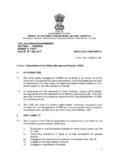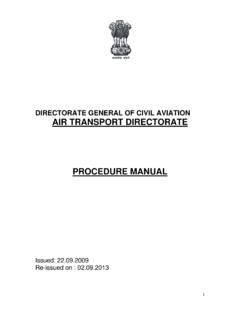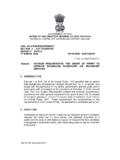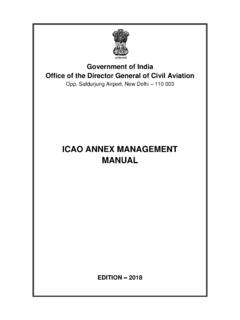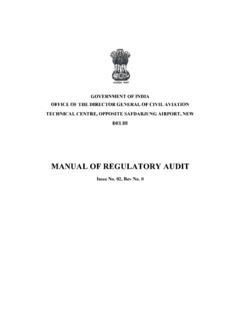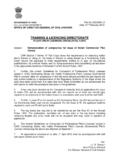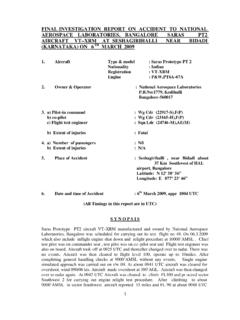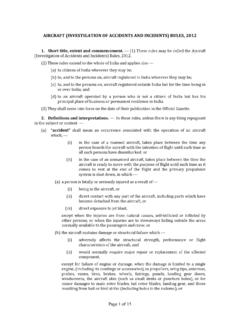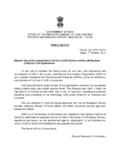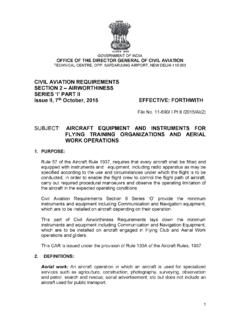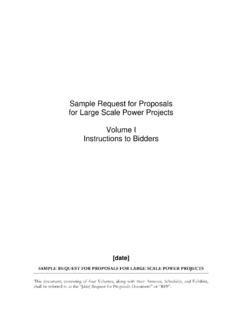Transcription of TRAINING POLICY FOR DGCA OFFICERS
1 Government of India Office of the Director General of Civil Aviation Opp. Safdurjung Airport, New Delhi 110 003. TRAINING POLICY . FOR. DGCA OFFICERS . EDITION - 2015. 1|Page PREFACE. Directorate General of Civil Aviation (DGCA) being a regulatory body has to ensure the competency of its workforce. Hence DGCA is committed to provide TRAINING or take other actions to reach the established level of competency, and evaluate the effectiveness of these actions. This POLICY document provides an overview of various TRAINING requirement of DGCA OFFICERS at all level. The TRAINING as envisaged will enable the OFFICERS to understand the context, duties and responsibilities, relevant regulatory provisions and make them familiar with the relevant ICAO documents.
2 This POLICY document of the DGCA provides common guidelines for all Directorates regarding various trainings to enhance the skills and competency of OFFICERS . The POLICY document sets forth the authority and procedural methods by which TRAINING Directorate as well as other Directorates plans and executes various trainings of DGCA OFFICERS at all level. Furthermore, this POLICY supersedes the POLICY document DGCA POLICY /TRG- 2006 dated 14th October 2006 and is also subject to amendment by DGCA to keep pace with the time and standards. (M. Sathiyavathy). Director General of Civil Aviation (Approved vide F. No. A-33022/16/2013-TRG. New Delhi 10th Day of September, 2015. Revised 8th Day of December 2015.)
3 2|Page 3|Page TRAINING POLICY FOR DGCA OFFICERS . 1. INTRODUCTION. International aviation standards require that a civil aviation authority provide its safety inspectors with comprehensive TRAINING to ensure the competency of its inspector workforce. Directorate General of Civil Aviation (DGCA) is a regulatory body, under Ministry of Civil Aviation, responsible for the safety oversight of civil aircraft operations in India. DGCA is committed to establish and control the competencies of its OFFICERS . For this purpose DGCA is committed to provide TRAINING or take other actions to reach the established level of competency, and shall evaluate the effectiveness of these actions.
4 The DGCA shall ensure that OFFICERS of DGCA are competent to carry out the tasks assigned to them and have the necessary qualification, experience and TRAINING to perform their respective functions. In order to ensure that the OFFICERS in DGCA are qualified, have operational or technical work experience and their TRAINING is compatible with the activities they are required to carry out, DGCA has prepared this TRAINING POLICY . 2. OBJECTIVE : Objective of this POLICY is to provide an overview of various TRAINING requirement of DGCA OFFICERS at all level. The TRAINING as envisaged will enable the OFFICERS to understand the context, duties and responsibilities, relevant regulatory provisions and make them familiar with the relevant ICAO documents.
5 The TRAINING imparted will ensure to meet the vision of DGCA Endeavour to promote safe and efficient air transportation through regulation and proactive safety oversight system'. 3. TRAINING PROGRAM. Each Directorate shall prepare its TRAINING programme for its OFFICERS as per this TRAINING POLICY . The TRAINING program for OFFICERS shall contain primarily the following trainings: Initial/ Induction TRAINING : The newly inducted OFFICERS shall be provided an induction TRAINING to enable OFFICERS to get a general understanding about the organisation, its vision, mission and acquire necessary competencies required for performing their job. On-the -job TRAINING : After Completion of Initial Induction TRAINING , the newly inducted OFFICERS will be provided on-the-job 4|Page TRAINING to enable them to handle their responsibilities independently.
6 Recurrent TRAINING : OFFICERS will be provided recurrent TRAINING to maintain/upgrade the competency level and also for updating their awareness to relevant regulations/developments etc. This TRAINING shall be conducted at least once in two years. Specialized/Technical TRAINING : (one-time courses taken any time ongoing process): DGCA shall nominate OFFICERS for technical and developmental courses as applicable. 4. INITIAL/ INDUCTION TRAINING . Initial/Induction TRAINING course will be conducted for each newly inducted officer in DGCA. There will be 3 modules. Module-I will be organised by the TRAINING Directorate in co-ordination with other directorates and TRAINING establishments.
7 The purpose of this Module is to familiarize OFFICERS with the Government System particularly DGCA and the functioning of the various Directorates. The Modules II & III will be structured and conducted by the concerned directorates and documented in their respective PM. Topics/Contents for Induction Module is placed at Appendix A'. Newly recruited OFFICERS are required to complete the Initial TRAINING course within the stipulated time frame in order to start On-the-job TRAINING (OJT) for their respective areas of posting. This will enable them to be more useful in providing assistance to senior OFFICERS at the preparatory level of work. ON-THE-JOB TRAINING . On-the-Job TRAINING entails the completion of three levels of TRAINING for each technical job function.
8 The three levels encompass the study of reference materials, task observation, and task performance, as further defined below. An OJT trainer must validate all Levels (I, II, and III) of performance. The OJT TRAINING process follows a logical progression of three levels as shown in the table below: Level Trainee Trainer Level I Knowledge Study Discuss Level II Understanding Observe Demonstrate Level III Performance Perform Evaluate Level-I TRAINING (Knowledge) is typically a self-study effort on the part of the trainee with guided discussion and validation conducted by the OJT. 5|Page trainer afterwards. The time allowed for this should be appropriate to the complexity of the task and the amount of material to be studied.
9 Levels II. and III involve the actual performance of the task. Level I TRAINING typically involve a review of all reference materials applicable to the job tasks for which TRAINING has been identified. Level I TRAINING may be satisfied through classroom TRAINING or other delivery methods. Level II TRAINING (Task Observation) involves observation of the performance of specific job tasks. This TRAINING typically involves the trainee observing and/or assisting the OJT trainer in the performance of those specific job tasks for which the trainee will be held accountable. Level II TRAINING may be satisfied through appropriate TRAINING that provides the opportunity for the trainee to observe and/or assist the trainer performing the task.
10 Level III TRAINING (Task Performance) involves the application of knowledge and skills to the performance of specific job tasks. Typically, the trainee performs the job task under the observation of a qualified OJT. trainer. The trainer assesses the performance of the task and indicates on the trainee's OJT TRAINING plan when Level III performance is achieved. Each Directorate will frame their own OJT Plan based on these guidelines. 5 RECURRENT TRAINING . DGCA OFFICERS require continuous development of their competencies related to their respective responsibilities. This should be accomplished through periodic TRAINING such as recurrent TRAINING or continuation TRAINING . To ensure that DGCA OFFICERS maintain proficiency and keep current on aircraft and equipment, techniques, procedures and new developments in their respective areas of expertise, it is essential that they receive periodic recurrent TRAINING .
